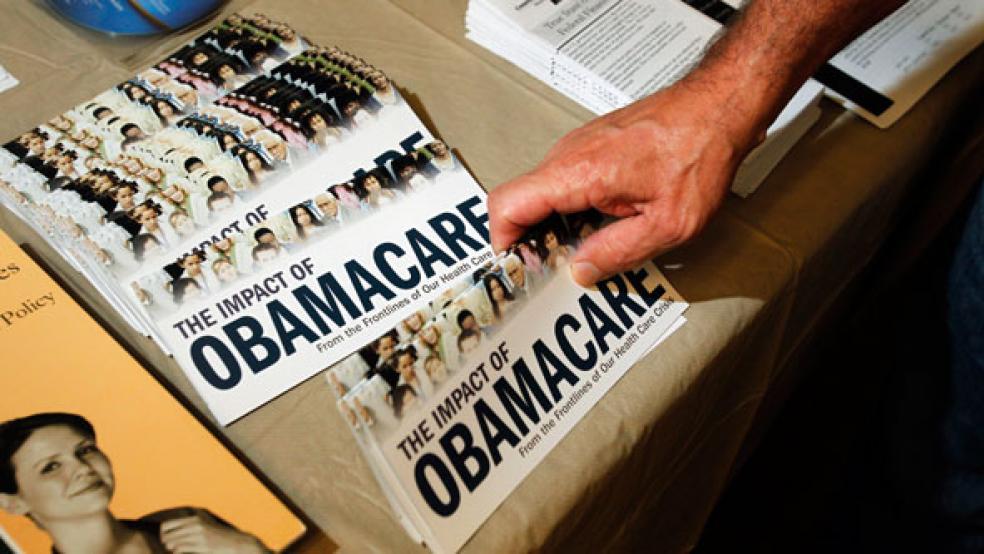If Republicans finally make good on their vow to repeal the Affordable Care Act -- but without adopting a suitable replacement -- 24 million Americans would be removed from the health care insurance rolls in 2021. And federal spending on health care would decline by $927 billion over the next decade, according to a provocative new study by the Urban Institute and the Robert Wood Johnson Foundation.
Donald Trump, the presumptive GOP presidential nominee, has vowed to repeal Obamacare as one of his first acts, although neither Trump nor Republican congressional leaders are anywhere close to a consensus on replacement legislation that wouldn’t leave millions of Americans in the lurch. House Republicans are planning to release the outline of a plan later this month.
Related: Get Ready for Huge Obamacare Premium Hikes in 2017
Projecting the impact of the repeal of Obamacare is not idle speculation. Last January, the GOP controlled House and Senate finally approved a measure to end the ACA, but without including an alternative approach. President Obama vetoed the legislation. But if Trump is sitting in the White House next January and the Republicans manage to retain control of the House and Senate, then Obamacare could go by the boards.
If that were to happen, 14.5 million fewer low-income people would lose Medicaid coverage while 9.4 million people would lose federal tax credits to purchase private health insurance on Obamacare exchanges, according to the new report. More than eight in ten of those losing coverage would be members of working families; 63 percent would have incomes below 200 percent of the poverty level and 40 percent would be young adults.
While on the surface, at least, the federal government would save nearly $1 trillion over the coming decade, state governments, hospitals and other medical providers would take a severe economic beating, as sharp reductions in federal spending for expanded Medicaid coverage for the poor would likely be offset by state spending increases of $68.5 billion between 2017 and 2026.
Thirty-two of the 50 states agreed to expand their Medicaid coverage for poor adults as part of the Affordable Care Act, with the federal government initially picking up the entire cost and the states eventually kicking in 10 percent. But if the Republicans succeeded in repealing Obamacare, most of those states would have to absorb massive losses in Medicaid, the Children’s Health Insurance Program and other benefits.
Related: More Bad News for the Remaining Obamacare Co-ops
Although the fiscal implications of a repeal of President Obama’s signature health insurance program has received scant attention to now, GOP leaders in Washington could end up feeling the heat from Republican as well as Democratic governors in state legislatures – as well as hospital and physician groups – if they try to pull the plug on Obamacare.
“Modest- and low-income families would forgo health care because of cost and lack of coverage, and health care providers would end up paying for more uncompensated care,” the report states..
Matt Buettgens, a senior research associate in the Urban League’s health policy center and a lead author of the report, said in an interview Monday that repeal of Obamacare and its support of expanded Medicaid could lead to “state budget shortfalls.” Huge new budgetary burdens on hospitals, doctors and other care providers would be forced to absorb the cost of treatment of indigent patients who turn to them for help.
Some states, including New York, Minnesota and Vermont that expanded Medicaid coverage on their own before the Affordable Care Act was enacted six years ago, would likely continue to provide the coverage even without the federal support. But other states’ that expanded Medicaid with the promise of full funding by the federal government would likely pull back, leaving health care providers, state prison systems and others holding the bag.
Related: How Small Ideas Are Helping to Bend the Health Care Cost Curve
“The uncompensated care issue would hit the states and health care providers very hard,” Buettgens said. “The loss of Medicaid expansion would also have an adverse impact on employment in many states where state hospitals are major employers” and might have to cut back on personnel to meet the added cost of care for the indigent.
Moreover, many states have reported net budget savings because of expanding Medicaid, the report says, especially in the treatment of patients incarcerated in state prison. Without Obamacare, those facilities would suffer budget shortfalls.
If the ACA were repealed with no replacement, the federal government would spend $90.9 billion less on health care for the non-elderly in 2021 than otherwise, according to the study. That includes $78.1 billion less in Medicaid and CHIP and $39.3 billion less in Obamacare premium tax credits and cost sharing.
However, those decreases would be partially offset by about $26.5 billion of additional federal spending on uncompensated care for the uninsured.





